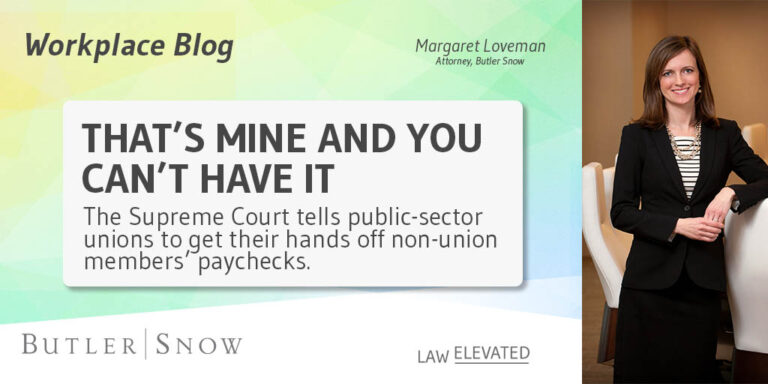On June 27, 2018, in one of the most significant decisions concerning collective bargaining rights in decades, the United States Supreme Court ruled 5-4 that state government employees who choose not to join a union may not be forced to pay union fees. Janus v. American Federation of State, County, and Municipal Employees, Council 31, et. al., 585 U.S. (2018). In doing so, the Court overturned 40 years of precedent.
By way of background, Illinois state law, like that of many states, permits unions to force non-union members of a bargaining unit to pay agency fees. These fees are essentially a percentage of full union dues. The fee, in theory, is supposed to cover union expenditures and should not go toward the union’s political and ideological projects. Semantics.
Mark Janus, an employee at the Illinois Department of Healthcare and Family Services, argued that the monthly agency fee to the American Federation of State, County, and Municipal Employees that was deducted from his paycheck violated his First Amendment Rights. He argued the fees were a form of political advocacy. The union responded that the agency fees prevented “free riding” employees from benefiting from the unions negotiations—a sentiment recognized by the Supreme Court as valid in 1977 in Abood v. Detroit Bd. of Educ.
The Supreme Court, however, reversed course and agreed with Janus. In an opinion written by Justice Samuel Alito, the majority of the Court found that “[c]ompelling individuals to mouth support for views they find objectionable violates that cardinal constitutional command, and in most contexts, any such effort would be universally condemned.”
So what does this mean for public sector unions? The majority recognizes “that the loss of payments from nonmembers may cause unions to experience unpleasant transition costs in the short term, and may require unions to make adjustments in order to attract and retain members.” The Court reasoned that “we must weigh these disadvantages against the considerable windfall that unions have received under Abood for the past 41 years. It is hard to estimate how many billions of dollars have been taken from nonmembers and transferred to public-sector unions in violation of the First Amendment.”
In a dissenting opinion, Justice Elena Kagan predicts that “[a]cross the country, the relationships of public employees and employers will alter in both predictable and wholly unexpected way.” Many unions, in fact, will face significant challenges to their sustainability. In the meantime, one thing is for sure: Many public sector employees are set to receive a little more jingle in their paycheck beginning next month.
Authored by [professional id=”2468″]

